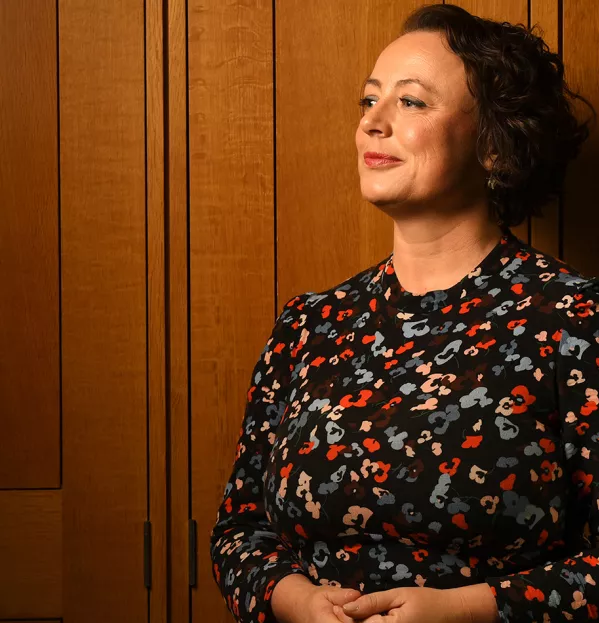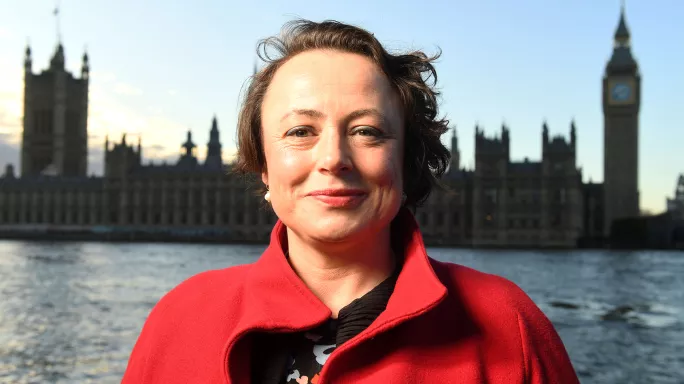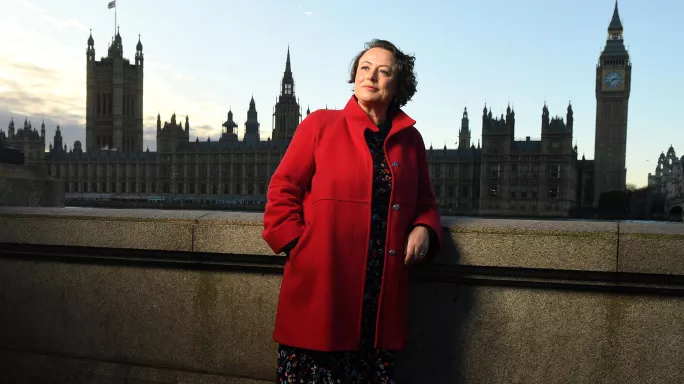Catherine McKinnell on Labour’s plans for education

Catherine McKinnell is a “details person”. And being a details person must have made the three months she has spent as shadow schools minister a challenge. Because right now in education, there is a lot of detail - across a lot of challenges - for a prospective schools minister to get a grip on.
“The list is really long,” she admits.
McKinnell believes she has the skill set to tackle these challenges.
Born in Newcastle upon Tyne, she attended a local comprehensive before going to the University of Edinburgh and then becoming an employment lawyer.
She became an MP for Newcastle upon Tyne North in 2010 and has held a range of high-profile positions in the Labour Party since: shadow solicitor general, shadow children’s minister, shadow exchequer secretary to the Treasury and shadow attorney general.
Forensic approach
Challenging injustice through a forensic approach has underpinned everything she has done.
“I was always a campaigner. I like to know what’s underneath what’s being said and why it’s being said and really get to grips with something,” she explains.
How might that approach complement that of her boss: fellow northerner, MP for Houghton and Sunderland South and shadow education secretary Bridget Phillipson?
McKinnell says that the two have “always maintained a lot of shared interests” ever since they (“literally”) walked into Parliament together 13 years ago. In particular, McKinnell argues they have a “shared understanding” of the challenges that their North East region faces.
Certainly, in public there has been no sign of a diversion of message between the two, but does she think she can keep everyone in the Labour Party - with its numerous polarising views on assessment and curriculum - happy?

For example, there has been significant internal pressure within the party to re-orientate the curriculum to be more skills based.
On this issue, McKinnell will only say that they are “really keen to listen to the experts on it and to consult and to have a real dialogue”.
Where she is willing to say more is on Ofsted, on which views also vary within the party. While McKinnell admits the system is “outdated” and needs to evolve, the Labour frontbench has stopped short of calls for total abolition - something that left Phillipson facing heckles from NEU members at the teaching union’s 2022 conference in Bournemouth.
At the time, Phillipson said: “To be supportive of inspection is not to believe it cannot be better.”
And Labour has been clear in recent months that under its government, Ofsted inspections would not be abolished but instead single-word inspection judgements would be replaced with a score card.
McKinnell reiterates now that “we know fundamentally we want to see change”.
Bringing back ‘the joy of teaching’
But there are some major players in Labour who are still pushing the education team to go further. The conclusion of the recent Beyond Ofsted inquiry - chaired by former schools minister and Labour peer Jim Knight - culminated in recommendations that schools should carry out their own self-evaluation through a new system.
For the moment, McKinnell is not willing to go that far.
“We want Ofsted to be less high stakes and stressful as a process, and more informative for parents - because at the moment it feels like the stakes are really high and it’s not actually delivering information that parents can use,” she argues.
On this and any other decisions the party would make, McKinnell stresses that engagement with the sector would be central. Labour would “listen to viewpoints”, with any changes proposed “based on evidence”, she says.
Indeed, Labour wants to “reset that relationship” completely across the sector.
‘We want Ofsted to be less high stakes and stressful, and more informative’
While this may be the case, every schools minister has areas they are passionate about and that form the backbone of their time in the role. For former schools minister Nick Gibb, for example, it was phonics and early reading. So, where will McKinnell focus?
She says that the government is “rightly proud” of the phonics programme - which she notes “Labour put in motion” - but says that while some of the standards on reading have improved, she now wants to measure “how much people are building those broader skills”.
Ultimately, though, she says she wants to put “the joy of teaching and the joy of learning” back into schools.
Labour’s ‘message of hope’
That’s a tough challenge to set in the current context. The Covid pandemic, which forced multiple periods of school closures in varying degrees across the country, led to the widening of the attainment gap, a mental health “tsunami” in schools and an absence crisis.
Meanwhile, school leaders and workforce experts have repeatedly raised the alarm over the “vicious cycle” of low recruitment and the fact that teachers are now leaving the profession at the highest rate in four years.
McKinnell believes a “real prime opportunity” during the pandemic to “reset” was missed and that this is partly driving some of these challenges.
She is determined Labour will make headway on these issues, but also says what is needed is for Labour to “deliver a message of hope for teachers” while being clear that it cannot “wave a magic wand and fix everything overnight”.

A good example of the size and complexity of the task ahead is pupil mental health.
The latest wave of the Mental Health of Children and Young People in England report found that one in five children and young people in England aged 8-25 had a probable mental disorder in 2023.
Cross-government working to tackle the mental health crisis, as well as SEND diagnosis backlogs, is something Labour has repeatedly said it is currently exploring. But McKinnell stresses that she wants pupils to have options.
“Not every child wants to address their mental health challenges…in a school environment,” she says, adding that Labour would invest in mental health community hubs as well.
The academisation question
What is likely to get in the way of any attempt to fix these - or any other issues - in education is the fragmentation of the school system Labour will inherit: academisation and the grouping of academies into trusts is still at an immature stage and it has left schools in myriad financial and structural contexts that will affect how successful policy implementation can be.
Trust leaders recently warned that the growth and shape of the academisation of schools is at a “tipping point” and there needs to be a “more mature conversation” about how it develops.
Does Labour have a plan to tackle this area?
McKinnell says that the focus on how schools are structured will come second to the party’s key priorities. On this, she is aligned with Phillipson who, at a recent fireside discussion in London, argued that parents aren’t concerned about school structures and the arguments around that are a bit of a “dead end”.
McKinnell says the answer is similar on issues such as grammar schools.
She does say that a Labour government wants to “build on what works” and avoid causing disruption in the sector. But she adds that “we are not focused on how the school system is structured. We want to focus on fixing what’s not working and what is not delivering for children”.
‘We cannot wave a magic wand and fix everything overnight’
A lack of a position on this may rattle some in the unions, a group Labour needs to be mindful of if it wins power at the next election; it would be safe to say that relationships between the current government and education unions have become increasingly sour over recent years.
While the pay settlement of a 6.5 per cent rise for teachers and leaders in July seemed to thaw relations, the icy status quo of the past few years quickly returned with quarrels over funding errors and, most recently, the decision by the Department for Education to open a consultation on creating minimum service levels to ensure that schools stay open to certain cohorts of pupils during teacher strikes.
How would McKinnell approach those relationships?
She says Labour wants to reset them in the same way it intends to reset the relationship between government and schools and that between schools and families.
“We need to make sure that we work in partnership with the unions,” she insists.
“It’s about working with people. These are voices that represent the people whom we are asking to do one of the most important jobs that can be done. So, to have that relationship of dialogue is really, really important.”
Room to breathe
If any of these challenges are causing McKinnell anxiety, she doesn’t show it. Her presence so far at sector conferences has been received positively, with a general consensus that she appears confident and tuned in to what the sector wants to hear.
And this job genuinely seems to be something she is relishing. She says that one of the reasons she was “delighted” to take up the role was to address “the world of challenge that meets the sector…to make sure…we have all the core subjects absolutely covered and that we have qualified teachers for every area, but also that there is room to breathe in that curriculum, for the arts, for drama, for creativity.”
It’s the opportunity for change that seems to excite her. But she is also realistic that she - and the sector - will need to be patient.
“There’s a good reason,” she says, “why it’s a 10-year mission.”
You need a Tes subscription to read this article
Subscribe now to read this article and get other subscriber-only content:
- Unlimited access to all Tes magazine content
- Exclusive subscriber-only stories
- Award-winning email newsletters
Already a subscriber? Log in
You need a subscription to read this article
Subscribe now to read this article and get other subscriber-only content, including:
- Unlimited access to all Tes magazine content
- Exclusive subscriber-only stories
- Award-winning email newsletters
topics in this article



